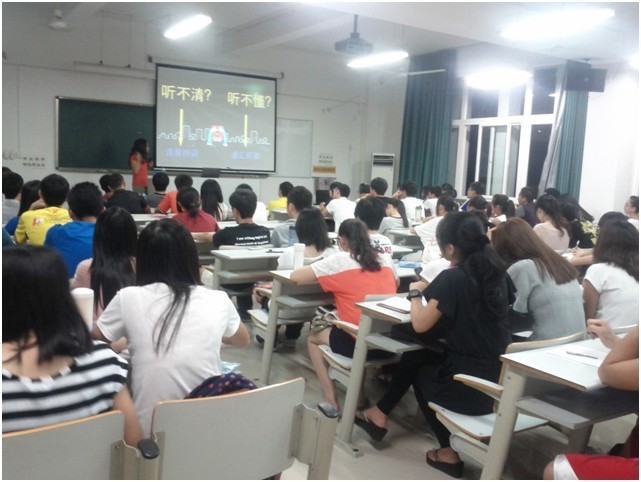高校英语六级考試(CET6),往年英语听力考试*题系列产品,致力于协助大伙儿运用历年英文六级听力考试*题来了解英语听力声音速度,娴熟六级听力答题方式,把握英语听力考试*题和解题的节奏感,自然这种用考试*题实际效果才算是非常好的,大道理大家都懂。
英语四级帮你取得毕业证书,英语六级帮你寻找好的工作。 英语六级过线代表着在机关事业单位薪水高1级,公司薪酬多1千,就算出国旅行,比四级水准都能多讲十句话。因此 ,假如你四级过去了,提议英语六级能考一定要考且过,终究将来几十年都是有连续性的收益。正所谓一朝投入,盈利近百年。 PS1:六级考试三套试卷用两个英语听力还分AB卷。因此 :这套英语听力有的辅导资料编为*一套,有的辅导资料编为第二套,相匹配上题型训练就可以。
英语听力考试*题 Section A Directions: In this section, you will hear two long conversations. At the end of each conversation, you will hear four questions. Both the conversation and the questions will be spoken only once. After you hear a question, you must choose the best answer from the four choices marked A), B), C)and D). Then mark the corresponding letter on Answer Sheet 1 with a single line through the center. Questions 1 to 4 are based on the conversation you have just heard. 1.A) Say a few words to thank the speaker. B)Introduce the speaker to the audience. C)Give a lecture on the history of the town. D)Host a talk on how to give a good speech. 2.A ) He was the founder of the local history society. B)He has worked with Miss Bligh for 20 years. C)He has published a book on public speaking. D)He joined the local history society when young. 3.A) She was obviously better at talking than writing. B)She had a good knowledge of the town’s history. C)Her speech was so funny as to amuse the audience. D)Her ancestors came to the town in the 18th century. 4.A) He read exactly what was written in his notes. B)He kept forgetting what he was going to say. C)He made an embarrassing remark. D)He was too nervous to speak up. Questions 5 to 8 are based on the conversation you have just heard. 5.A) What their retailers demand. B)What their rivals are doing. C)How they are going to beat their rivals. D)How dramatically the market is changing. 6.A) They should be taken seriously. B)
They are rapidly catching up. C)Their business strategy is quite effective. D)Their potential has been underestimated. 7.A) She had given it to Tom.C) She had not seen it yet. B) It simply made her go frantic.D) It was not much of a big concern. 8.A) Restructuring the whole company. B)Employing more forwarding agents. C)Promoting cooperation with Jayal Motors. D)Exporting their motorbikes to Indonesia. Section B Directions: In this section, you will hear two passages. At the end of each passage, you will hear three or four questions. Both the passage and the questions will be spoken only once. After you hear a question, you must choose the best answer from the four choices marked A), B), C) and D). Then mark the corresponding letter on Answer Sheet 1 with a single line through the center. Questions 9 to 11 are based on the passage you have just heard. 9.A) It makes claims in conflict with the existing research. B)It focuses on the link between bedtime and nutrition. C)It cautions against the overuse of coffee and alcohol.

D)It shows that “night owls” work much less efficiently. 10.A) They pay greater attention to food choice. B)They tend to achieve less than their peers. C)They run a higher risk of gaining weight. D)They stand a greater chance to fall sick. 11.A) Get up late. B) Sleep 8 hours a day. C) Exercise more. D) Go to bed earlier. Questions 12 to 15 are based on the passage you have just heard 12.A) All of the acting nominees are white. B) It has got too much publicity on TV. C) It is prejudiced against foreign films. D) Only 7% of the nominees are female. 13.A) 22 percent of movie directors were people of color. B)Half of the TV programs were ethnically balanced. C)Only one-fifth of TV shows had black characters. D)Only 3.4 percent of film directors were women. 14.A) Non-white males. B) Program creators. C) Females of color over 40. D) Asian speaking characters. 15.A) They constitute 17% of Hollywood movie characters. B)They are most underrepresented across TV and film. C)They contribute little to the U.S. film industry. D)They account for 8.5% of the U.S. population. Section C Directions: In this section, you will hear three recordings of lectures or talks followed by three or four questions. The recordings will be played only once. After you hear a question, you must choose the best answer from the four choices marked A), B),
C) and D). Then mark the corresponding letter on Answer Sheet 1 with a single line through the center. Questions 16 to 18 are based on the recording you have just heard. 16.A) One that can provide for emergency needs. B)One that can pay for their medical expense. C)One that covers their debts and burial expenses. D)One that ensures a healthy life for their later years. 17.A) Purchase insurance for their children. B)Save sufficient money for a rainy day. C)Buy a home with a small down payment. D)Add more insurance on the breadwinner. 18.A) When their children grow up and leave home. B)When they have saved enough for retirement. C)When their family move to a different place. D)When they have found better-paying jobs. Questions 19 to 22 are based on the recording you have just heard. 19.A) They do more harm than good. B)They have often been ignored. C)They do not help build friendship. D)They may not always be negative. 20.A) Biased sources of information. B)Ignorance of cultural differences. C)Misinterpretation of Shakespeare. D)Tendency to jump to conclusions. 21.A) They are hard to dismiss once attached to a certain group. B)They may have a negative impact on people they apply to. C)They persist even when circumstances have changed. D)They are often applied to minorities and ethnic people. 22.A) They impact people more or less in the same way. B)Some people are more sensitive to them than others. C)A positive stereotype may help one achieve better results. D)A negative stereotype sticks while a positive one does not. Questions 23 to 25 are based on the recording you have just heard. 23.A) Use some over-the-counter medicine instead. B)Quit taking the medicine immediately. C)Take some drug to relieve the side effect. D)Ask your pharmacist to explain why it occurs. 24.A) It may help patients fall asleep. B)It may lead to mental problems. C)It may cause serious harm to one’s liver. D)It may increase the effect of certain drugs. 25.A) Tell their children to treat medicines with respect. B)Keep medicines out of the reach of their children. C)Make sure their children use quality medicines. D)Ask their children to use legitimate medicines.
大学英语六级听力考试真题训练
核心提示:高校英语六级考試(CET6),往年英语听力考试*系列产品,致力于协助大伙儿运用历年英文六级听力考试*来了解英语听力声音速度,娴熟六级听力答题方式
- 下一篇:高校英语四六级考试成绩测算的方式分享
- 上一篇:大学英语六级听力考试真题分享
更多>同类资讯
- 01-11
太阳用英语怎么说
- 01-11
英文四级翻译中华传统茶道文化模拟试题
- 01-11
英文四级真题语汇分享
- 01-11
高校英语四级阅读分享
- 01-11
英语四级英语语法知识限制性和非限制性定语从句解读
- 01-11
英语六级英语语法知识:more than要点解读
- 01-11
英语六级英语语法知识不定代词要点解读
- 01-11
英语六级英语的语法常见知识要点解读训练
- 01-11
英文四级词汇解读
- 01-11
英语四级英语语法知识结果状语从句共享
- 01-11
英语四级英语语法知识标准状语从句
- 01-11
英语四级英语语法知识原因状语从句
更多>相关课程
热门资讯
推荐资讯

预约免费试听
只要一个电话
我们免费为您回电









